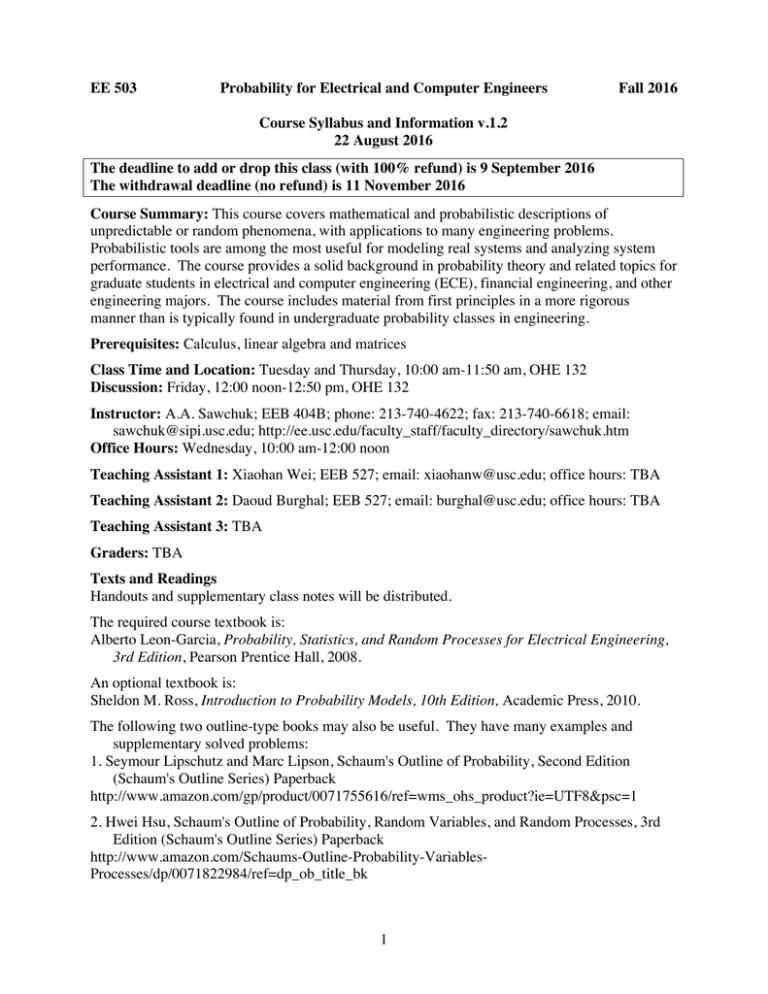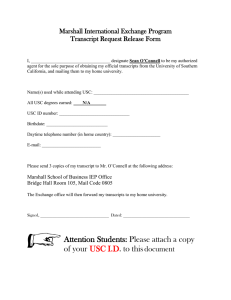
EE 503
Probability for Electrical and Computer Engineers
Fall 2016
Course Syllabus and Information v.1.2
22 August 2016
The deadline to add or drop this class (with 100% refund) is 9 September 2016
The withdrawal deadline (no refund) is 11 November 2016
Course Summary: This course covers mathematical and probabilistic descriptions of
unpredictable or random phenomena, with applications to many engineering problems.
Probabilistic tools are among the most useful for modeling real systems and analyzing system
performance. The course provides a solid background in probability theory and related topics for
graduate students in electrical and computer engineering (ECE), financial engineering, and other
engineering majors. The course includes material from first principles in a more rigorous
manner than is typically found in undergraduate probability classes in engineering.
Prerequisites: Calculus, linear algebra and matrices
Class Time and Location: Tuesday and Thursday, 10:00 am-11:50 am, OHE 132
Discussion: Friday, 12:00 noon-12:50 pm, OHE 132
Instructor: A.A. Sawchuk; EEB 404B; phone: 213-740-4622; fax: 213-740-6618; email:
sawchuk@sipi.usc.edu; http://ee.usc.edu/faculty_staff/faculty_directory/sawchuk.htm
Office Hours: Wednesday, 10:00 am-12:00 noon
Teaching Assistant 1: Xiaohan Wei; EEB 527; email: xiaohanw@usc.edu; office hours: TBA
Teaching Assistant 2: Daoud Burghal; EEB 527; email: burghal@usc.edu; office hours: TBA
Teaching Assistant 3: TBA
Graders: TBA
Texts and Readings
Handouts and supplementary class notes will be distributed.
The required course textbook is:
Alberto Leon-Garcia, Probability, Statistics, and Random Processes for Electrical Engineering,
3rd Edition, Pearson Prentice Hall, 2008.
An optional textbook is:
Sheldon M. Ross, Introduction to Probability Models, 10th Edition, Academic Press, 2010.
The following two outline-type books may also be useful. They have many examples and
supplementary solved problems:
1. Seymour Lipschutz and Marc Lipson, Schaum's Outline of Probability, Second Edition
(Schaum's Outline Series) Paperback
http://www.amazon.com/gp/product/0071755616/ref=wms_ohs_product?ie=UTF8&psc=1
2. Hwei Hsu, Schaum's Outline of Probability, Random Variables, and Random Processes, 3rd
Edition (Schaum's Outline Series) Paperback
http://www.amazon.com/Schaums-Outline-Probability-VariablesProcesses/dp/0071822984/ref=dp_ob_title_bk
1
Grading
Your course grade is determined by a process of reasoning. Everyone will receive the highest
grade justified by available evidence from the following data:
2 Midterms
Final
Homework
= 23.5% each (in class, Tuesday, 4 October and Tuesday, 8 November)
= 40% (will be given Tuesday, 13 December, 8:00 am-10:00 am as listed in the
USC exam schedule; there are NO exceptions to this date - if you can't take
the final at this time, do not enroll in this course)
= 13% (two lowest average homework grades will be discarded)
DEN students in the local area must come to campus for the exams.
Attendance in class is required. Many examples and applications not in the text will be covered
in the lectures.
Homework
Homework will be assigned every week on Thursday, and due the following Thursday.
Homework will be graded – solutions are provided on Tuesday following the due date. You can
turn in homework late until solutions are posted for full credit. No credit after solutions
appear. It is extremely important to keep up with the lectures and to do the homework
problems. Many details and applications of the principles are learned by doing problems.
Course Web Site and Email
Make sure your email listed in USC records is up-to-date; I will contact you often by email. The
course web site is accessible through https://courses.uscden.net/d2l/home.
Academic Integrity - Cheating
Cheating or plagiarism will not be tolerated on homework or exams. You may discuss
homework problems among yourselves, but each person must do their own work and submit
individual solutions written in their own hand. Copying or turning in identical homework sets is
cheating. The penalty ranges from F on the homework or exam, to an F in the course, to
recommended expulsion. See:
http://viterbi.usc.edu/academics/integrity/
http://sjacs.usc.edu/students/academic-integrity/
https://libraries.usc.edu/research/reference-tutorials
If you have any questions regarding academic integrity - see the instructor.
USC Statement on Academic Integrity
USC seeks to maintain an optimal learning environment. General principles of academic
honesty include: the concept of respect for the intellectual property of others, the expectation that
individual work will be submitted unless otherwise allowed by an instructor, and the obligations
both to protect one’s own academic work from misuse by others as well as to avoid using
another’s work as one’s own. All students are expected to understand and abide by these
principles. SCampus, the Student Guidebook, (www.usc.edu/scampus or
http://scampus.usc.edu) contains the University Student Conduct Code (see University
Governance, Section 11.00)
2
Week
Start
Date
End
Date
Course Topics
1
22-Aug
26-Aug
2
3
4
29-Aug
5-Sep
12-Sep
2-Sep
9-Sep
16-Sep
5
19-Sep
23-Sep
6
7
26-Sep
3-Oct
30-Sep
7-Oct
8
9
11
10-Oct
17-Oct
24-Oct
14-Oct
21-Oct
28-Oct
12
13
31-Oct
7-Nov
4-Nov
11-Nov
14
14-Nov
18-Nov
15
21-Nov
25-Nov
16
17
18
28-Nov
5-Dec
12-Dec
2-Dec
9-Dec
16-Dec
Algebra of events; set theory; sample and event spaces;
probability axioms; independence
Conditioning; Bayes rule
Counting; combinatorics
Sequential experiments; Bernoulli trials, discrete and
continuous random variables (RVs) and densities
Common densities: Gaussian, Poisson, Cauchy;
expectation; moments; two or more RVs
2D densities
4-Oct-Midterm 1; 2D expectation; covariance;
correlation; one function of one RV
One function of two RVs
Two functions of two RVs; jointly normal RVs
Characteristic functions; discrete and continuous
transforms
Central limit theorem; approximations; bounds
8-Nov-Midterm 2; sample mean; laws of large numbers;
convergence; parameter estimation
Vector RVs; Gaussian random vectors; estimation of
RVs
24-Nov-Thanksgiving Holiday-no class; estimation of
RVs: MAP, ML, MMSE, linear, nonlinear; stochastic
processes; discrete time Markov processes
1-December-Last day of class; Markov chains
Study week - possible review class
13-December-Final exam - 8-10 am
Follow-on Classes
EE 450 Introduction to Computer Networks (3)
EE 511 Simulation Methods for Stochastic Systems (1)
EE 512 Stochastic Processes (3)
EE 517 Statistics for Engineers (3)
EE 562a Random Processes in Engineering (3)
3


